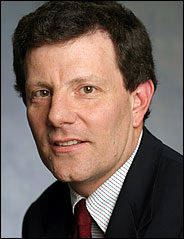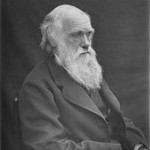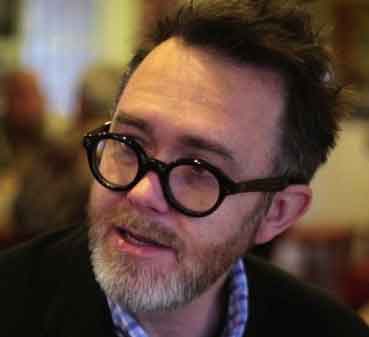Galileo Galilei, father of modern science
In this series, we’ve looked at a few examples of powerful narratives that gained significant cultural influence. In part two, I discussed how the teaching of American history has become dominated by a highly distorted narrative that paints European immigrants (largely white and Christian) as oppressive villains, and Native Americans as oppressed victims.
Here, we’ll examine yet another narrative that has a tight grip on the imaginations of many millions: the so-called “war between science and religion.”
I first became aware of how powerful this narrative was during a family reunion in Cape Cod, Massachusetts some 20 years ago. It was my first meeting with my wife’s extended family. Many of her cousins were accomplished scholars, having attended private boarding schools in Massachusetts, and elite Ivy League universities. As an evangelical Christian from Oregon with a far more conventional educational pedigree, I was clearly outside their normal social circles, and they were intrigued by me. One afternoon as we were relaxing on the deck enjoying conversation, one of the cousins asked a more personal question. They hadn’t met many Christians, and had always wondered: How do Christians justify their faith in God when science has long proven that all forms of life (including human life) are the result of a completely natural and unguided process of evolution? How was it possible for Christians to take their faith seriously in the face of indisputable scientific facts? Did we simply ignore such facts and pretend they don’t exist?
The questioner wasn’t trying to mock or insult—he was asking sincerely.
I’ve encountered versions of this narrative countless times since. In the latest post in this series, I talked about how universities have become “factories of narrative perpetuation.” I quoted New York Times editorial writer Nicholas Kristof, who admitted that universities overwhelmingly discriminate against evangelical Christians when it comes to faculty hiring because they want uniformity of thought behind their preferred secular narratives. His article created something of a firestorm, with thousands of comments posted. Here is the most popular comment with other readers, receiving 1,106 “likes” to date:
 What are some of these conservative views that secular, liberal America is missing out on? That the Bible is the literal word of God? … That evolution is not real? … Diversity of intelligent thought is terrific, but it’s challenging to find intelligent thought in conservatism … you don’t diversify with idiots – it’s intellectual suicide. [Conservative Christians] have adopted a Fourth Century worldview that’s at odds with the realities of the 21st century. The modern world has very little use for religion and conservatism because they’re predicated on … supernatural fantasies …” (emphasis added).
What are some of these conservative views that secular, liberal America is missing out on? That the Bible is the literal word of God? … That evolution is not real? … Diversity of intelligent thought is terrific, but it’s challenging to find intelligent thought in conservatism … you don’t diversify with idiots – it’s intellectual suicide. [Conservative Christians] have adopted a Fourth Century worldview that’s at odds with the realities of the 21st century. The modern world has very little use for religion and conservatism because they’re predicated on … supernatural fantasies …” (emphasis added).
That’s a pretty good summary of the narrative. The heroes are the secular-minded offspring of the enlightenment who know the truth and understand reality based on science and reason. The most important scientific “fact” is evolution, for it disproved once and for all the existence of God and made it possible, in the words of Richard Dawkins, to “be an intellectually fulfilled atheist.”
The villains are religious believers who deny the truth as revealed by science because it conflicts with their faith. They are superstitious throwbacks to the Dark Ages. They are anti-reason, anti-science, and prefer to live in a world of fantasy by denying evolution. For these reasons, it is easy for people who subscribe to this narrative to argue that conservative Christians should not be allowed to hold positions in academia. After all, “you don’t diversify with idiots.”
This narrative has a long history—going back at least to the 17th century and the European Enlightenment. It was created largely to discredit Christianity and help establish an emerging secular worldview. During the violently anti-Christian French Revolution, the revolutionaries famously erected a statue to “the goddess of reason” in Paris, while at the same time, desecrating the magnificent cathedral of Notre Dame. These early European enlightenment advocates successfully portrayed the Middle Ages as church-dominated “Dark Ages” before science and reason illuminated the mind and liberated it from bondage to superstition.
 Charles Darwin became the great high priest of this new secular religion. His theory of evolution essentially overthrew the need for a Creator God and established an entirely naturalistic account of how life arose and evolved into the diversity that exists today. According to the narrative, Christianity was overthrown from its place of cultural preeminence by science and reason—and particularly by the “fact” of Darwinian evolution. The “war against science and religion” was a shorthand way of describing the ongoing, failing attempts by a defeated Christendom to regain the cultural high ground.
Charles Darwin became the great high priest of this new secular religion. His theory of evolution essentially overthrew the need for a Creator God and established an entirely naturalistic account of how life arose and evolved into the diversity that exists today. According to the narrative, Christianity was overthrown from its place of cultural preeminence by science and reason—and particularly by the “fact” of Darwinian evolution. The “war against science and religion” was a shorthand way of describing the ongoing, failing attempts by a defeated Christendom to regain the cultural high ground.
This narrative has taken deep root in the imaginations of many millions in the West and all over the world. For many, this describes reality. Like all narratives, there is an element of truth in it, which helps to account for its power. It is true that in the late Middle Ages there was a great weariness with religious warfare between Catholics and Protestants. Both had become seemingly more interested in retaining political power than in standing for the truth. Likewise, Darwin’s theory gained plausibility because of indisputable evidence for adaptations within species. The famous Galapagos Finches do, in fact, have beaks that become longer or shorter depending on climate and food availability.
Many Christians were founders of modern science
But the narrative is also highly distorted, to the point of being almost entirely false.
The narrative paints Christianity as antiscience, when in fact, deeply committed Christians such as Bacon, Newton, Copernicus and many others were the founders of modern science. The scientific method grew from the soil of a biblical worldview, and would never have emerged from a secular worldview. Science depends on several things that only a biblical worldview provides, such as an orderly (as opposed to a random or chaotic) universe that functions according to defined laws that can be described mathematically. It takes a great deal of faith to look at the intricacy and highly engineered inner-workings of a cell, or an eye, or a galaxy, and believe that it all happened by chance in a purposeless universe that has no “ends” in mind. Christianity also explains how humans can use reason to inquire into creation and offer explanations. We are, after all, made in God’s image, with creativity, a mind, and the ability to reason. Secularism provides no real basis for human reason, or even a human mind.
Is evolution a proven fact of science? Well, it depends on what you mean by evolution. The “big claim” of evolution is that all life forms evolved from earlier life forms over millions of years through a completely natural, unguided process of mutation and selection. A random birth defect (a mutation) turns out to provide an advantage to the survival of a life form, so it is “selected” and retained. Over time, entire new species are formed through this process. Thus, humans used to be apes, and horses used to be fish, which used to be bacteria.
That’s a big claim. Is it a scientifically proven fact? Not even close. In fact, while there is ample evidence to support changes and adaptations within a species (microevolution), there is virtually no scientific evidence to support change from one species to another (macroevolution). You won’t find credible evidence in the fossil record, only a lot of hoaxes. You won’t find proof emerging from experimentation in the lab. So how can scientists continue to call this a scientific fact? Many respond that macroevolution has to be a fact, for how else do you account for all the various life-forms that exist without introducing a supernatural Creator, which, because it cannot be proven scientifically, cannot be real? Only science has the ability to reveal what is factual—what is real.
It should be easy to see that people who speak this way are not speaking scientifically. They are making a metaphysical claim—that the only things that ultimately exist are matter and energy, and that the only way to understand truth is through the scientific method. This is religion masquerading as science. It is scientism—a secular religious  faith. According to Rod Dreher, “Scientism is the ideologically charged fallacious belief that science is the only legitimate way of knowledge.” There is no war between science and Christianity, but there is a conflict between Christianity and scientism—a conflict between two opposing metaphysical truth claims. If you are a believer in the secular faith of scientism, the big claim of evolution must be true, even if there is no scientific evidence to support it, which is why Richard Dawkins could say: “Biology is the study of complicated things that give the appearance of having been designed for a purpose” then proceed to argue that they were not.
faith. According to Rod Dreher, “Scientism is the ideologically charged fallacious belief that science is the only legitimate way of knowledge.” There is no war between science and Christianity, but there is a conflict between Christianity and scientism—a conflict between two opposing metaphysical truth claims. If you are a believer in the secular faith of scientism, the big claim of evolution must be true, even if there is no scientific evidence to support it, which is why Richard Dawkins could say: “Biology is the study of complicated things that give the appearance of having been designed for a purpose” then proceed to argue that they were not.
The war between science and religion is largely a false narrative
The “war between science and religion” narrative depends on a deceptive trick—the deliberate concealment of the all-important distinction between macroevolution and microevolution. According to the narrative, your position on macroevolution—for or against—defines whether you are for or against science. Here the term “evolution” is used without distinguishing between simple change within a given species over time, on the one hand, or, on the other, a wholly secular account for how all life began and formed.
A lot is invested in this narrative, for upon it rests the entire edifice of the secular worldview that has become dominant in the West and much of the rest of the world. Because so much is at stake, those who dare oppose it are ruthlessly attacked, vilified and marginalized. Distinguished scientists who challenge the narrative on scientific grounds are fired, denied tenure, or not allowed to have their findings published in scientific journals. Ben Stein’s documentary No Intelligence Allowed puts this repressive impulse on full display.
You know you’ve encountered a narrative when those who hold it react with indignation and an impulse toward repression and marginalization. That’s a sure sign of a narrative. Sincere truth-seekers don’t respond this way.
A final note: I’m indebted to Philip Johnson’s seminal book Darwin on Trial, and the outstanding work of Discovery Institute in helping me to better understand this narrative and its many deceptions.
- Scott Allen






